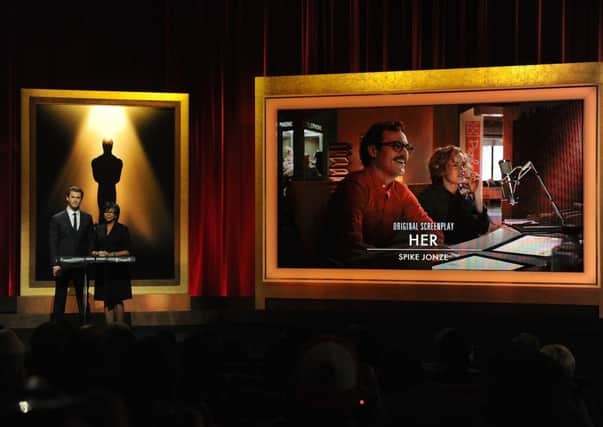Her, Spike Jonze’s own break-up movie


When Sofia Coppola’s Lost In Translation came out a decade ago, speculation was rife that it reflected her disintegrating marriage to filmmaker and promo director Spike Jonze. There was lonely Scarlett Johansson after all, wandering around Tokyo, trying to figure out who she’d really married while her hipster photographer husband (Giovanni Ribisi) obsessed over the pop bands he’d been flown into shoot, blithely unaware of the ennui his new wife was experiencing. When Coppola and Jonze subsequently announced their separation, it wasn’t much of a stretch to view Johansson and Ribisi as proxies for the unhappy couple.
But while doing so necessarily cast Jonze in a less than favourable light, Lost In Translation never felt like a wilfully cruel or salacious film; rather it felt like an emotionally honest attempt by Coppola to confront how lonely marriage could feel when entered into with the wrong person.
Advertisement
Hide AdThat’s perhaps why she has little to fear from Jonze’s new film Her, which finds the writer/director similarly poring over the detritus of a failing marriage. Although buried within an ingeniously realised sci-fi love story about a lonely letter-writer (Joaquin Phoenix) who falls for his artificially intelligent computer operating system (coincidentally voiced by Scarlett Johansson, brought in to replace first choice Samantha Morton in post-production), it’s not hard to read his protagonist’s anxieties about his inability to properly connect with his estranged wife (Rooney Mara) as the fictionalised musing of someone who’s gone through something similar. Like Lost In Translation, Her has the resonant sting of real life and the two films play like fascinating flipsides to one another.
Of course there’s something a little prurient about projecting biographical details on to any work of art, but in an industry famed for its insincerity, there’s also something thrilling about trying to unlock the creative secrets of any film that boasts such emotional honesty and rawness. Just look at Richard Linklater’s Before Sunset (2004) – the bittersweet second instalment of the romantic saga he began in 1995 with Before Sunrise and continued last year with the much more downbeat Before Midnight. Where the breezily optimistic first film was inspired by an incident that happened to Linklater in his youth, Before Sunset saw stars Ethan Hawke and Julie Delpy – then in their thirties – take ownership of the characters, co-writing the script and using details from their own lives to better reflect what Jesse and Celine might be going through. And at that time, Hawke was going through the implosion of his marriage to Uma Thurman (with whom he has two children). As a result, the themes and preoccupations of the second film ended up being a little heavier and more complex, with Jesse no longer the fresh-faced romantic idealist he was in Before Sunrise, but an unhappily married father prone to describing his failing relationship thus: “I feel like I’m running a small nursery with someone I used to date.” Ouch.
Before Sunrise slyly acknowledged that its makers were drawing on reality by kicking off with a discussion of novelist Thomas Wolfe’s belief that writers can’t stop themselves from using the “clay of life” when creating fiction. Not all filmmakers, however, are quite as keen to own up to this. Woody Allen, for instance, routinely complains that audiences confuse his life with the lives of his characters (something he’s attributed in interviews to his failure early on to draw a distinction between his physical appearance on film and his day-to-day appearance in reality). Such blanket denial of any autobiographical intent means that when we watch Annie Hall we’re not really supposed to view it as a riff on Allen’s own faltering relationship with Diane Keaton, but as something entirely fictional (even though it was written for Keaton and featured his character, Alvy Singer, grappling with the way real life is fictionalised to illuminate home truths).
Nor are we presumably supposed to view Husbands And Wives, in which Allen plays a novelist who finds himself attracted to an 18-year-old college student just as his marriage to Mia Farrow’s character is falling apart, as a reflection of any simmering tumult in his personal life. It’s merely an uncannily poignant and insightful piece of fiction and definitely not about his break-up with Mia Farrow, which occurred during the making of that very movie.
Then again, perhaps honesty about fictionalising a failing relationship is directly proportional to how clear a filmmaker’s conscience is. The late Nora Ephron lived her life by the maxim “everything is copy”. She made no secret of the fact that her own wickedly funny adaptation of her debut novel Heartburn was an account of the break-up of her marriage to Washington Post reporter Carl Bernstein, whom she’d caught having an affair while she was seven months pregnant. Doubtless Bernstein, who’d helped uncover the Watergate scandal, preferred the heroic portrayal Dustin Hoffman gave of him in All The President’s Men to the one Jack Nicholson provided as the philandering Mark (the film ends with Meryl Streep – playing Ephron cipher Rachel – shoving a cake in his face). But in attempting to salve her own pain by humiliating her ex for his betrayal, Ephron did also create an intensely moving, honest and insightful account of modern marriage.
And that’s a running theme through most great movies about relationship break-ups. While it may be painful or embarrassing or difficult to talk about, when filmmakers write with specificity about something they know – regardless of how they dress it up – it has a better chance of connecting with audiences in a deep way. The best filmmakers understand that, whether they acknowledge it or not.
• Her is in cinemas from 14 February